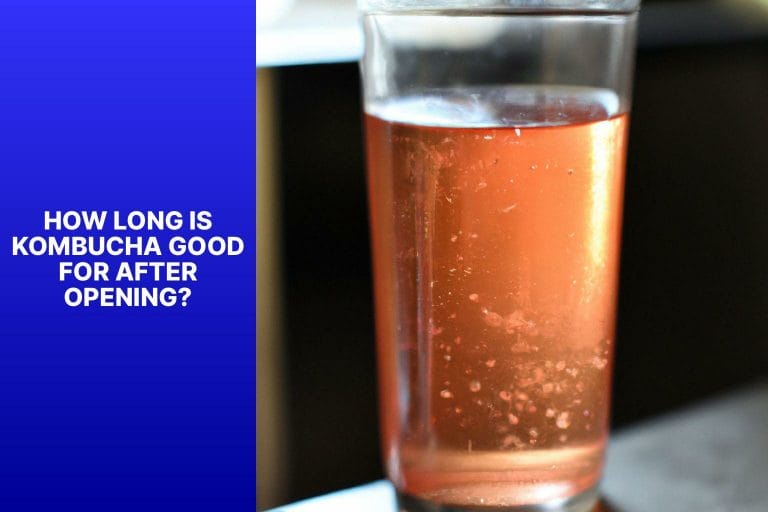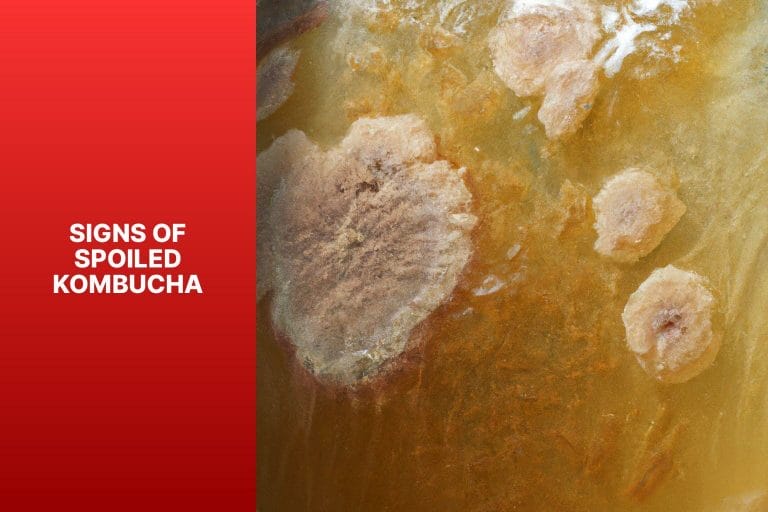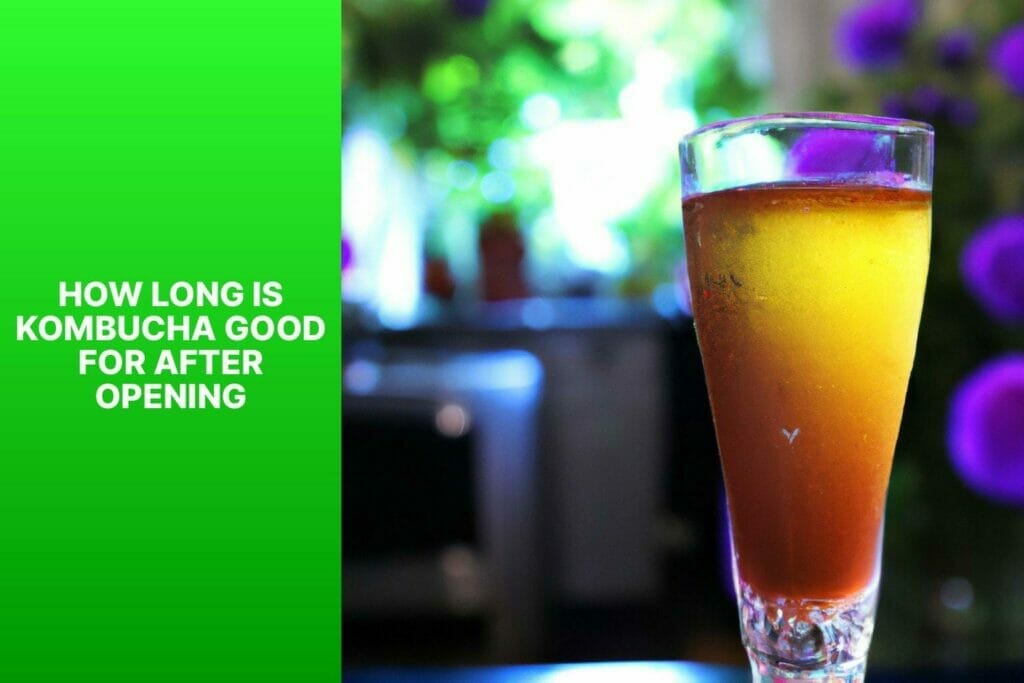Kombucha, a fermented tea beverage, has gained popularity for its potential health benefits and unique flavor profile. Once opened, how long can you safely consume kombucha? Let’s dive into the details.
What is Kombucha?
Kombucha is a beverage that ferments sweetened black or green tea with a symbiotic culture of bacteria and yeast (SCOBY). This fermentation produces a tangy, fizzy drink rich in probiotics, vitamins, and antioxidants.
How Long is Kombucha Good for After Opening?
The shelf life of opened kombucha varies depending on several factors. Once opened, consuming kombucha within 7 to 10 days is generally recommended to enjoy its optimal taste and quality. It is essential to consider certain factors that can affect its shelf life.
What Factors Affect the Shelf Life of Opened Kombucha?
Several factors can impact the shelf life of opened kombucha. Exposure to air, temperature fluctuations, and contaminants can accelerate the fermentation process and spoilage of the beverage.
The kombucha’s sugar content, acidity, and overall quality can also influence its longevity.
Does Kombucha Expire?
Kombucha does not have a strict expiration date like some perishable foods. Its taste, quality, and probiotic content may degrade over time, affecting the beverage’s enjoyment and potential health benefits.
Signs of Spoiled Kombucha
It is important to be able to recognize if your kombucha has spoiled. Signs of spoiled Kombucha include a foul or off-putting odor, mold growth, a significant increase in carbonation, or an overly acidic taste.
If you observe any of these signs, it is best to discard the kombucha.
How to Properly Store Opened Kombucha?
Proper storage is key to preserving the freshness and quality of opened kombucha. Storing opened kombucha in a cool, dark place away from direct sunlight and extreme temperature fluctuations is recommended to maintain its optimal taste.
Can You Refrigerate Opened Kombucha?
Refrigeration can help slow the fermentation process and extend the shelf life of opened kombucha. Storing it in the refrigerator can help maintain its taste and quality for longer.
Can You Freeze Opened Kombucha?
Freezing kombucha is not recommended, as it can affect its taste and texture adversely. The water content in the beverage may expand during freezing, causing changes in the overall consistency and potentially damaging the live cultures in kombucha.
Can You Still Drink Kombucha Past its Best-Before Date?
While it is generally safe to consume kombucha past its best-before date, the taste, and quality may not be at their peak.
It is advisable to use your judgment, check for signs of spoilage, and consider overall storage conditions before consuming kombucha past its recommended date.
Importance of Properly Storing and Consuming Kombucha
Properly storing and consuming kombucha is essential to retain its nutritional benefits and taste.
By following storage guidelines and paying attention to signs of spoilage, you can fully enjoy the goodness of kombucha while minimizing the risk of any adverse effects on your health.
Key takeaway:
- Kombucha’s shelf life after opening is influenced by various factors: Factors like proper storage, exposure to air, temperature, and the quality of the kombucha itself can affect its shelf life after opening.
- Kombucha has an expiration date: While kombucha doesn’t necessarily expire, its quality and taste can deteriorate over time after opening.
- Signs of spoiled Kombucha: Mold growth, a sour or vinegary smell, and a strange taste are indications that the kombucha is spoiled and should not be consumed.
What is Kombucha?
Kombucha is the ancient elixir loved by health enthusiasts worldwide! In this section, we’ll unravel the mystery behind this fermented tea.
Get ready to sip on fascinating insights as we dive into the definition and overview of kombucha and uncover the intriguing fermentation process that gives it its unique flavors.
So, grab a bottle (or brew your own!) and join us on this kombucha-infused journey of discovery!
Definition and Overview of Kombucha
Kombucha, the fermented tea beverage made by fermenting sweetened tea with a culture of bacteria and yeast called a SCOBY, has a long history and is believed to have originated in East Asia.
It is often called the “tea of immortality” due to its potential health benefits.
Although research on kombucha’s health effects is limited, it is known to contain probiotics, which support gut health, and antioxidants that help reduce inflammation and protect against oxidative stress.
When properly brewed, kombucha has a slightly sweet and tart flavor with a subtle vinegar note.
It can be enjoyed plain or infused with fruits, herbs, or spices for additional taste enhancement. The alcohol content in kombucha is typically low, usually measuring around 0.5% or less.
Since kombucha is perishable, its shelf life can vary. Storing opened kombucha in the refrigerator is recommended to extend its freshness, which slows down fermentation and helps maintain its quality.
Consuming open kombucha within a week is best for optimal taste and enjoyment.
The Fermentation Process of Kombucha
Fermenting Kombucha is essential for creating this highly sought-after tea drink. Sweetened tea and a SCOBY, or symbiotic culture of bacteria and yeast, are prepared.
The SCOBY then ferments the tea by consuming the sugar and converting it into alcohol. This alcohol is eventually metabolized into organic acids, which give kombucha its distinctive tangy flavor.
Typically, the kombucha ferment kombucha takes anywhere from 7 to 14 days, depending on Temperature, SCOBY strength, and personal taste preferences.
The longer the fermentation process, the stronger and more acidic the resulting kombucha becomes.
Throughout the fermentation period, a new layer known as a baby SCOBY forms on the surface of the liquid. This can be utilized to start a fresh batch or shared with other fermentation enthusiasts.
A solid understanding of fermentation is essential for home brewers and kombucha lovers alike. By following proper fermentation practices, the safety and overall quality of the final product are ensured.
How Long is Kombucha Good for After Opening?

Photo Credits: Standardkombucha.Com by Douglas Nguyen
When kombucha opens, it is important to consider how long it remains good. It can be safely consumed for 7-10 days before its quality declines.
Storing the opened kombucha in the refrigerator is recommended to extend its freshness as it slows the fermentation process. Even refrigerated, consuming it within 7-10 days is still best.
Over time, the taste and quality of kombucha may change after opening, becoming more tart and losing carbonation. To ensure it is still palatable, it is essential to taste the kombucha before consuming it.
It is worth noting that the probiotic content in kombucha increases the longer it is stored after opening. To maximize the health benefits, consuming kombucha after opening is advisable.
By considering these factors and following the suggested timeframes, you can enjoy your kombucha while it is still fresh and of the best quality.
Factors Affecting the Shelf Life of Opened Kombucha
A variety of factors can influence the shelf life of opened kombucha. Temperature, air exposure, and additional ingredients all play a role.
Storing kombucha in the refrigerator below 40°F (4°C) is essential, as higher temperatures can encourage the growth of harmful bacteria and yeasts, leading to spoilage.
To avoid contamination and the hastening of fermentation, it is advised to tightly seal the container and consume the kombucha within a few days.
If you add flavors or additives after opening, be aware that this may introduce microorganisms that can reduce the shelf life.
Therefore, it is best to consume flavored kombucha sooner rather than later.
Considering these factors, you can maintain the freshness and safety of your opened kombucha. Always store it in the refrigerator, seal the container tightly, and avoid adding compromising ingredients.
Does Kombucha Expire?
It can be consumed past its best-before date if stored properly. The fermentation process of kombucha creates an acidic and low-pH environment that inhibits the growth of harmful bacteria and mold.
This allows kombucha to have a longer shelf life compared to other beverages.
The taste and quality of kombucha may deteriorate over time. As kombucha ages, it can become more vinegary and lose its effervescence.
It may also develop a slightly sour taste. These flavor changes are normal but may not be desirable to everyone.
To ensure the best quality, consume kombucha within a few months after opening. Proper storage is key.
Keep opened kombucha refrigerated at all times and seal the bottle tightly after each use. This will slow down fermentation and preserve taste and carbonation.
Signs of Spoiled Kombucha

Photo Credits: Standardkombucha.Com by Kevin Adams
Foul Odor: A strong, unpleasant smell may indicate spoiled kombucha. It could have a slightly tangy or vinegary aroma, but discard it if it smells rotten or rancid.
Mold Growth: Visible mold on the surface of kombucha is a definite sign of spoilage. Mold can appear as fuzzy patches, irregular spots, or unusual discoloration. Never consume kombucha with mold, as it can harm your health.
Unusual Texture: Kombucha should be smooth and slightly effervescent. Clumps, strings, or slimy particles in your drink may indicate spoilage.
Off Taste: Kombucha has a tangy and mildly acidic taste. It is likely spoiled if it tastes sour, rotten, or unpleasant. Trust your taste buds and discard any kombucha that doesn’t taste right.
Excessive Carbonation: While kombucha is naturally fizzy, too much carbonation can indicate over-fermentation. If your kombucha is overly bubbly or erupts when opened, it may have spoiled and is no longer safe to consume.
Remember, prioritize your health when consuming fermented beverages. If you notice any signs of spoiled kombucha, discard it to avoid potential health risks.
How to Properly Store Opened Kombucha?
Properly storing opened kombucha is essential to retain its freshness and maximize its shelf life. Let’s uncover the secrets to keeping your kombucha delicious and potent for as long as possible.
We’ll dig into the sub-sections of refrigeration and freezing to discover the best methods for preserving your opened kombucha’s flavor and probiotic benefits.
Get ready to master the art of kombucha storage and elevate your drinking experience!
Refrigeration of Opened Kombucha
When it comes to refrigerating opened kombucha, there are a few kombuchas that need attention:
- Temperature: It is important to store opened kombucha in the refrigerated kombucha at 38 to 40 degrees Fahrenheit (3 to 4 degrees Celsius) to slow fermentation and maintain its freshness.
- Airtight Container: Transfer the opened kombucha to an airtight container before refrigerating to preserve carbonation and prevent contamination.
- Duration: Generally, refrigerated opened kombucha can maintain kombucha for up to 2 weeks. It is worth noting that after this time, the taste and quality of the kombucha may start to decline. To fully enjoy the optimal taste and quality, consuming opened kombucha within the first week of refrigeration is recommended. This ensures that you can savor its delicious flavors and experience all the benefits it has to offer.
Kombucha is believed to have originated in Northeast China or the Manchuria region, where it was traditionally consumed for its potential health benefits.
From there, it gradually spread to Russia and Europe before gaining popularity worldwide. Today, kombucha is a beloved beverage well known for its refreshing taste and probiotic-rich properties.
Freezing of Opened Kombucha
Freezing of opened kombucha is a common method to extend its shelf life. To freeze opened kombucha effectively, follow these steps:
1. Transfer the opened kombucha to a container made for freezing, leaving room at the top for expansion.
2. Ensure that the container is sealed tightly to prevent the entry of air or moisture.
3. Label the container with the freezing date to keep track of its freshness.
4. Put the container in the freezer and set the temperature at least 0°F (-18°C).
5. Allow the kombucha to freeze for at least a few hours to ensure thorough chilling.
6. When you’re ready to consume it, defrost the kombucha in the refrigerator to dethaw it, resulting in optimal taste and quality.
Pro-tip: Avoid freezing kombucha in its original glass because it may crack as it expands. Instead, use a freezer-safe plastic or silicone container with a lid that seals tightly.
Freezing opened kombucha helps preserve its kombucha and retain its goodness for longer. Remember to follow appropriate defrosting procedures and consume it within 1-2 weeks after thawing for the best taste and quality.
Enjoy your frozen kombucha!
Can You Still Drink Kombucha Past its Best-Before Date?
Is it safe to drink kombucha past its best-before date? Kombucha is a fermented tea with live cultures that act as natural preservatives.
These cultures maintain drink integrity and prevent harmful bacteria growth. Though taste and quality may change slightly, consuming is still safe.
To determine if kombucha is still good, use your senses. Look for mold, off-putting smells, or unusual textures. If it appears, smells, or tastes spoiled, avoid drinking it.
Note that the longer kombucha passes its best-before date, the more the flavor and fizz may decrease. Consume it within a reasonable time frame for a fresher taste and more carbonation.
Importance of Properly Storing and Consuming Kombucha
Properly storing and consuming kombucha is of utmost importance to ensure its quality and safety. Temperature plays a crucial role in this process.
Storing kombucha at a temperature range of 8°F (1-3°C) is recommended as it helps slow the fermentation process, maintain the flavor, and retain its carbonation.
Another factor to consider is light exposure. Harmful UV rays can negatively affect kombucha, so using amber glass kombucha or refrigerated, opaque containers is advisable to shield them from such exposure.
Moreover, air exposure should be minimized to maintain the freshness of kombucha. Once opened, it is essential to tighten the bottle and consume it within a few days to ensure its optimal taste and quality.
To further ensure safety and quality, it is important to avoid contamination. This can be achieved by using clean utensils and taking precautions not to touch the bottle’s mouth with hands or surfaces, thus preventing cross-contamination.
Following these guidelines lets you enjoy kombucha’s health benefits and taste while keeping it fresh and safe.
How Long Kombucha is Good for After Opening:
- ✅ kombucha can last 5 to 7 days after opening when refrigerated. (Source: The Cultivation of Cozy)
- ✅ Unopened kombucha, if refrigerated, can last up to 4 months: The Cultivation of Cozy)
- ✅ kombucha will start to lose its fizz after opening: The Cultivation of Cozy)
- ✅ Mold growth is unlikely due to kombucha’s acidity and good bacteria content. (SKombucha’s Cultivation of Cozy)
- ✅ A strong, off taste and foul smell can identify bad kombucha. (Source: The Cultivation of Cozy)
